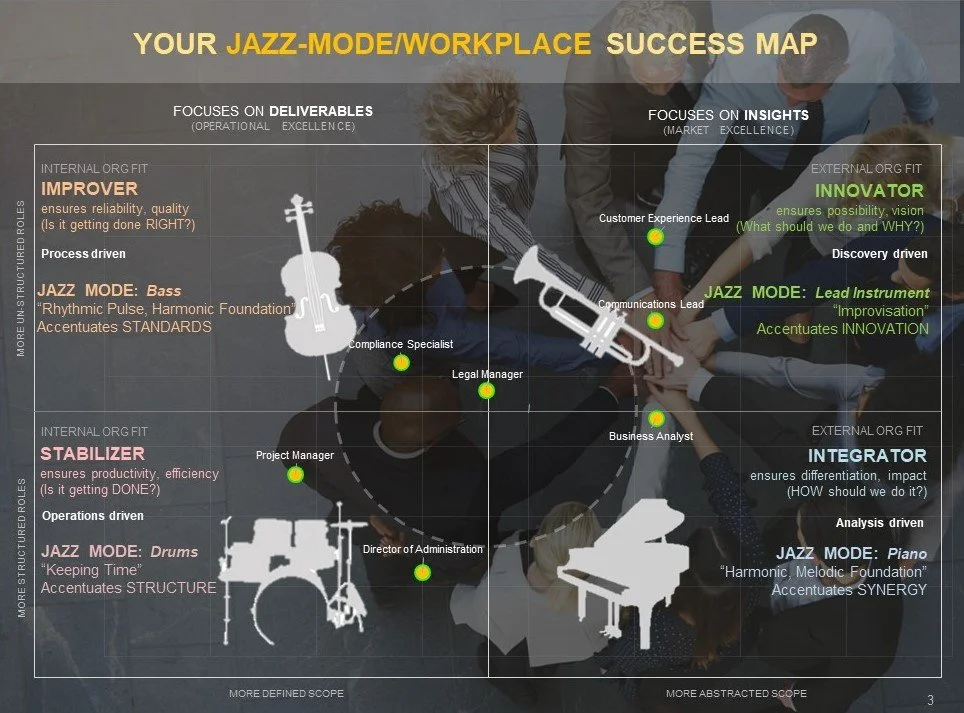Your Self—Your Instrument
This past week, two individual comments from noted actors illuminated the concept of self as instrument—a philosophy that we’ve tapped into for our Jazz Leadership Project model.
LaTanya Richardson Jackson is directing a revival of August Wilson’s Piano Lesson—for which Wilson won the Pulitzer Prize in 1990. Speaking about one of her actors, John David Washington (Denzel’s son), Jackson said that she viewed her responsibility for Washington as being charged by God to “take care of and nurture.” This is Washington’s first play. Speaking to Washington, she said, “Your instrument is built soundly. We are going to give you the notes, and all you have to do is play them.”
Yahya Abdul Mateen II is making his Broadway debut in the upcoming production of Suzan Lori Parks’ Topdog/Underdog, which won the Pulitzer Prize and Outer Critics Circle Award in 2002. In a recent interview, Mateen says that he needs to have his instrument ready so he can give his best. His process and preparation for the role is intense and includes yoga, vocal work, as well as mentally preparing to tell his character’s story. Mateen wants the people in the balcony to feel everything he is giving.
It was revealing to hear these self as instrument reference from stage actors. Just as we translate jazz principles and practices to the business landscape, it was not surprising to see this musical translation to theatrical performance.
Jazz Bassist Christian McBride at one of our jazz productions at Alvin and Friends Restaurant in New Rochelle
The Musicality of It All
A musician’s instrument is a source of creative expression—a revelation of feelings and emotions through the imaginal soundscape. A musician must learn everything about her instrument to be able to produce the tone, timbre, color, texture, melody, harmony, dynamics, and form that will make her contribution to the performance one of value. High-level musicianship means knowing your instrument inside and out—its history, make, model, techniques, fingerwork, and so much more.
As jazz musicians strive for mastery on their instruments, owning our instrumentality correlates to the development of our self-knowledge and expertise. The use of self as instrument is at the core of our uniqueness and a measure of the value we bring to those we engage with.
In the Organizational Development field, self as instrument, known as use of self, has been written about and practiced as a method to influence and impact behavior, intention, choice, and outcomes. One definition is:
Use of self is the conscious use of one’s whole being in the intentional execution of one’s roles for effectiveness in whatever the current situation is presenting. The purpose is to be able to execute a role effectively, for others and the system they’re in, without personal interference (e.g., bias, blindness, avoidance, and agendas) … to have clear intentions and choice.
—”Managing Use of Self for Masterful Professional Practice”, David W. Jamieson, Matthew Auron and David Shechtman (2010)
We can use the discovery of self as instrument:
To play creatively and find joy in the moments
To experiment with our instrument, allowing for recognition of the potential we hold
To harmonize others, valuing what they bring
To develop our instrument means committing to deliberative practice to master our skills
To tune ourselves personal for growth and development, working towards inner transformation to the next level of being.
To develop a deep self-awareness through observation and refinement.
Aligning with Your Instrument
JLP’s Team Success Matrix, designed by Mark Palmer of Hire Direction
In our Jazz Leadership Project work, one of our assessments analyzes the workstyle preference of individuals, and, along with their team members, maps them into their particular quadrants. Each quadrant is aligned with a jazz instrument and reveals how it functions in an ensemble. Team members gain greater clarity in how they can work more in concert with each other and better understand where tensions may come from. We recently worked with a client, who likened himself an Innovator (lead instrument like a sax), which is discovery-driven and facilitates innovation. The results of his assessment illustrated that his primary center was a Stabilizer (the drums)—operations driven and facilitating functional solutions. Interestingly, the way he described his leadership style, prior to seeing his results, affirmed his Stabilizer preference. His reaction was, “It makes sense.”
A different perspective, through a jazz lens, brought a deeper understanding and greater clarity. Isn’t that what we all could use to play better?



